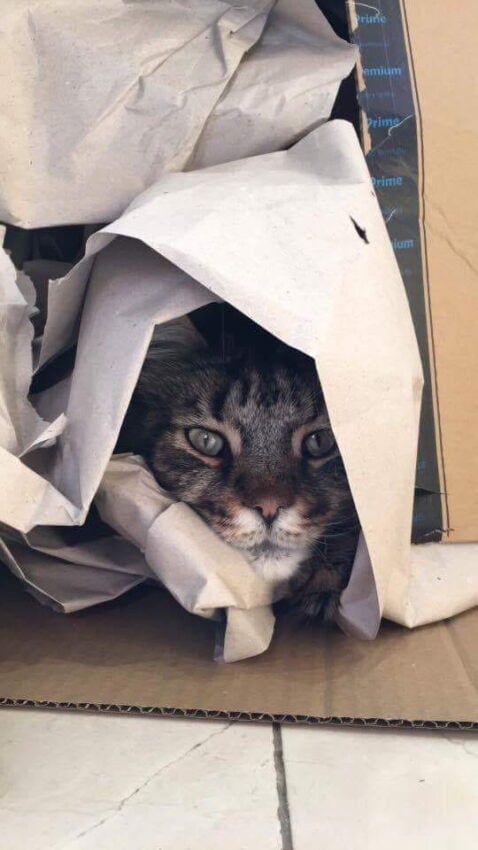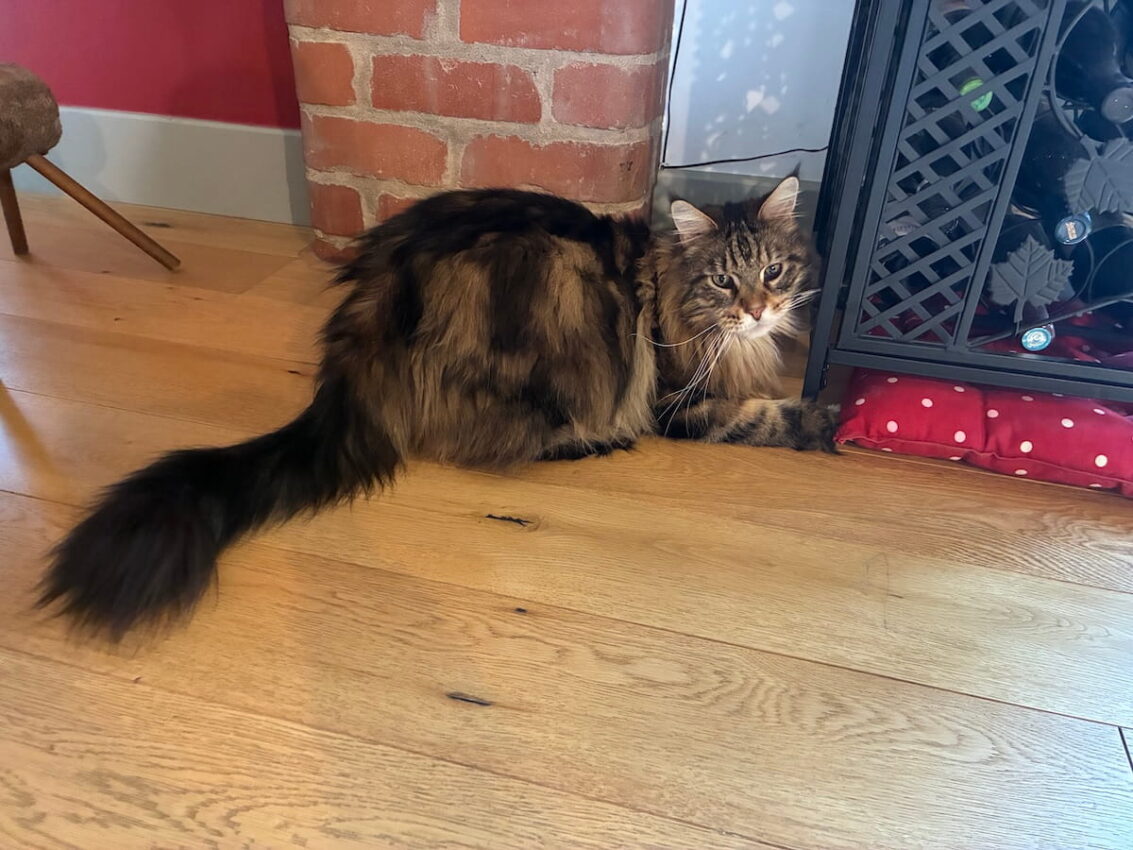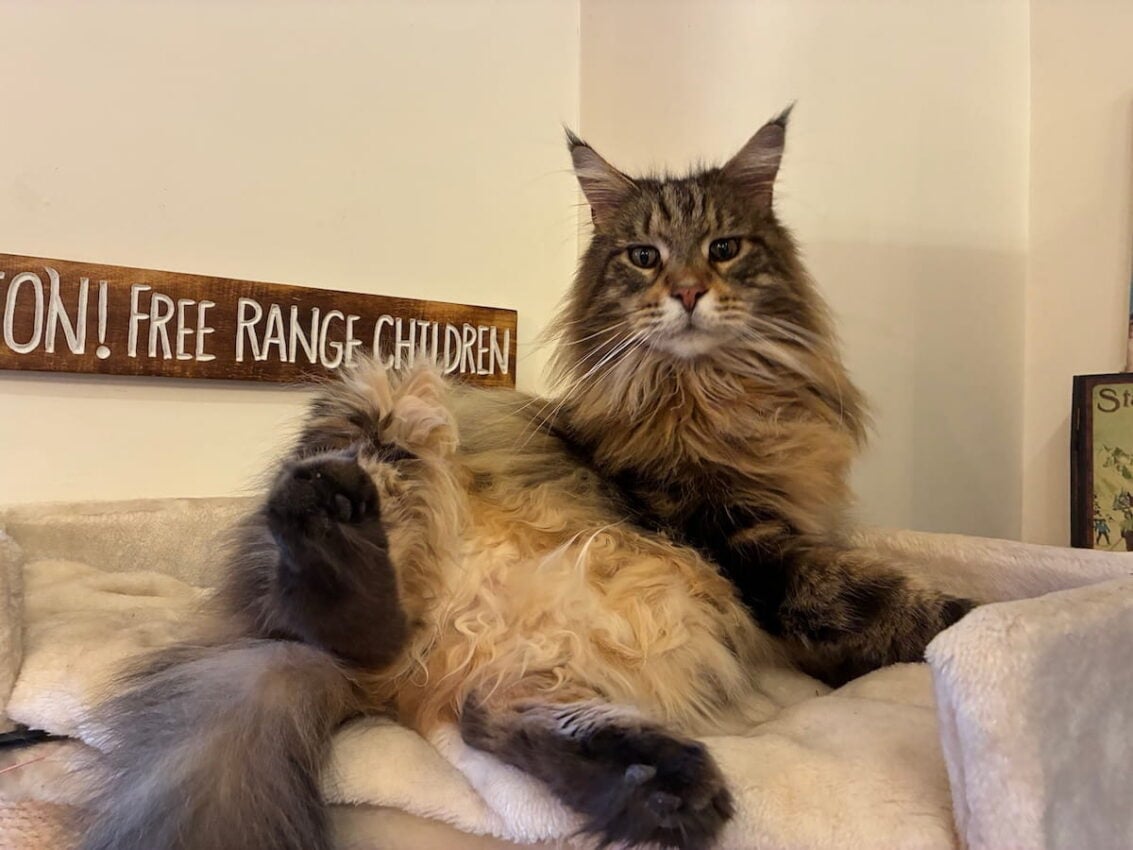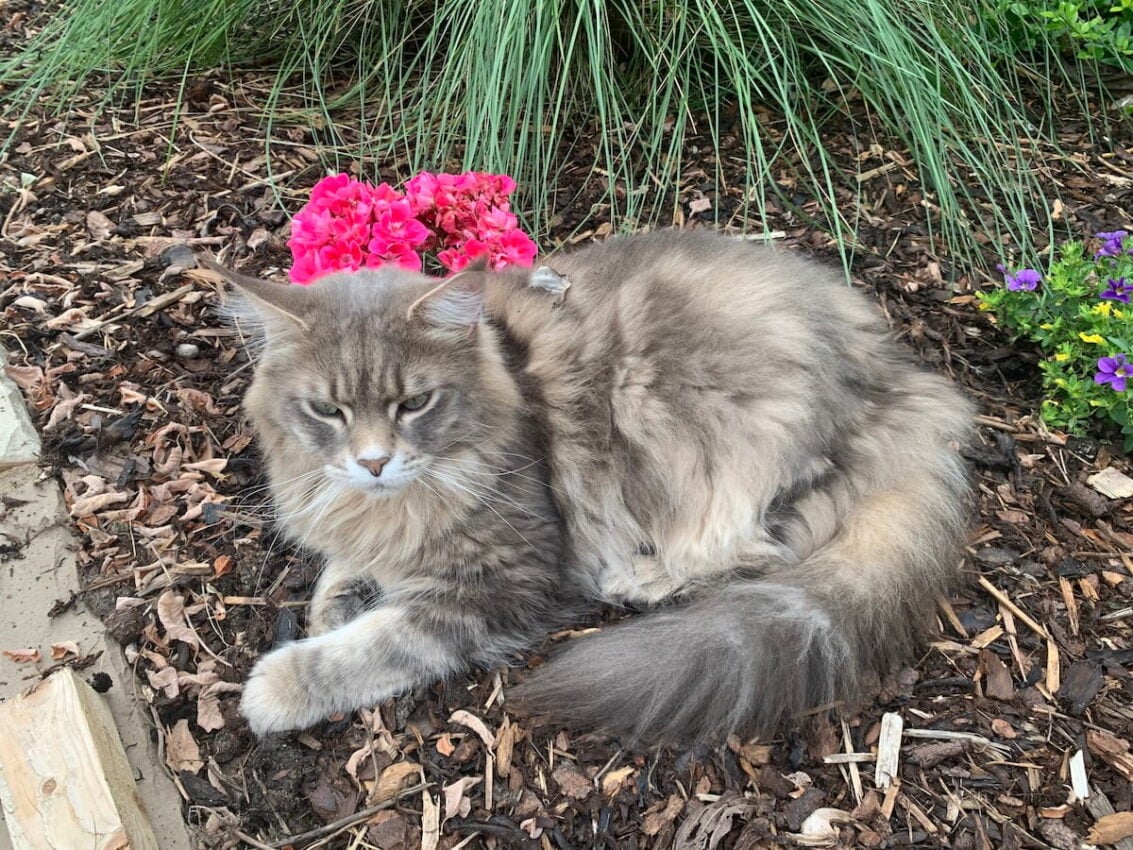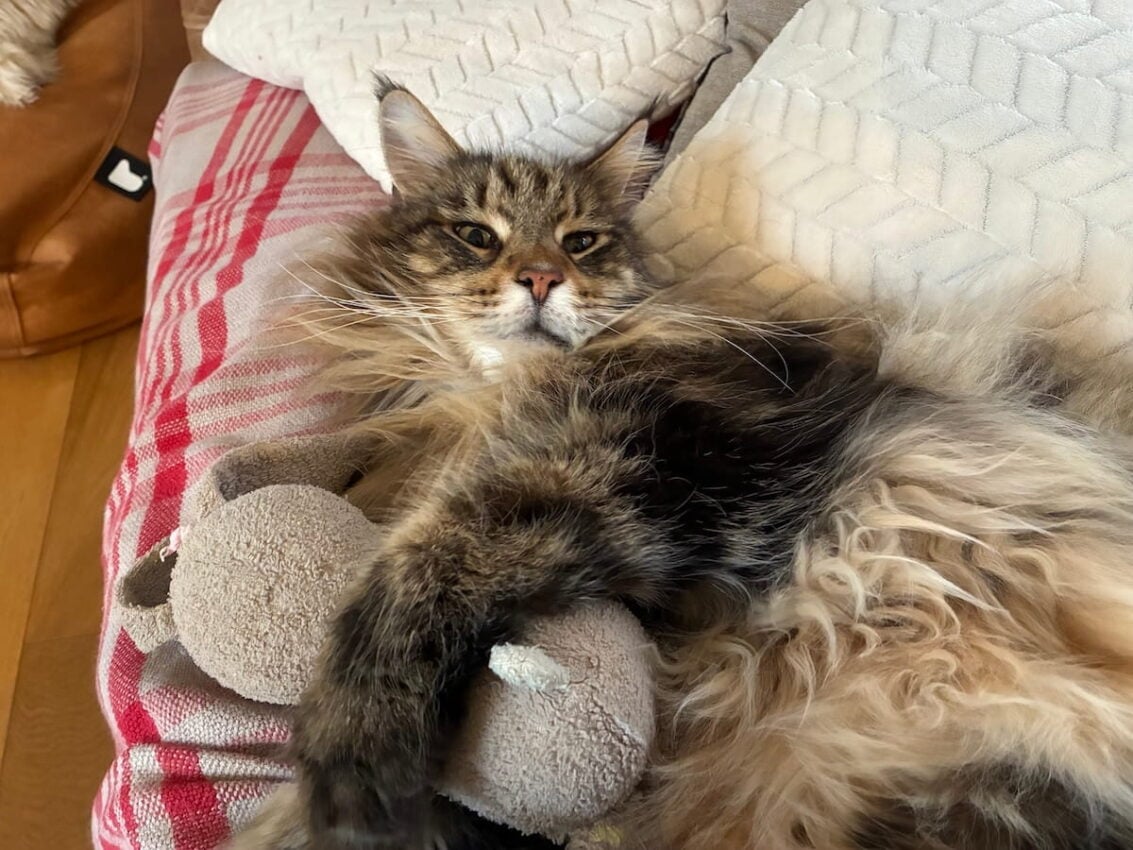Maine Coon Stressed? Causes, Symptoms & How To Calm Them Safely

Maine Coon cats are known for their affectionate, intelligent, and playful nature, but like any other breed, they can experience stress.
While occasional stress is normal, chronic or severe stress can lead to serious health and behavioral problems. Therefore, feline owners must understand the warning signs, causes, and treatment options.
Stress in cats is the body’s response to feeling unsafe, out of control, or unable to predict what happens next. In the short term, that stress response can be useful (it helps a cat hide, flee, or stay alert). But when the trigger keeps happening, for example, ongoing multi-cat tension, repeated noise fear, or pain, the “on edge” state becomes chronic.
That’s when you start seeing knock-on effects like litter tray changes, overgrooming, appetite shifts, and stress-linked urinary problems.
Quick Answer
Quick answer: Yes, Maine Coons can get stressed – and the fastest way to help is to reduce pressure and increase predictability. If possible, remove the trigger, give them a quiet “safe zone” room, protect key resources (food, water, litter tray, beds) from other pets, and keep the day-to-day routine steady.
Urgent vet red flags (same day): Straining to pee, crying in the litter tray, repeated trips producing tiny amounts, blood in urine, vomiting, collapse, or sudden extreme lethargy. If you suspect a urinary blockage (especially in male cats), treat it as an emergency.
Created by Mainecooncentral.com
Is Stress Normal For This Breed?
Many Maine Coons are confident, social, and adaptable, which can make them appear less reactive to everyday change, but their intelligence and strong bonding mean they can still become stressed when their environment feels unpredictable or unsafe.
Dangers Of Chronic Stress
If a Maine Coon experiences ongoing stress, it can result in serious health and behavioral problems, including:
| Stress- Related Issue | Description |
|---|---|
| Weakened Immune System | Stress can suppress the immune system, making the cat more susceptible to infections and illnesses. |
| Digestive Issues | Stress can lead to diarrhea, vomiting, constipation, and appetite loss. |
| Urinary Problems | Stress is a known trigger for feline lower urinary tract disease (FLUTD), which includes painful conditions like bladder inflammation and urinary blockages. |
| Behavioral Changes | A stressed Maine Coon may become aggressive, withdrawn, or start avoiding social interactions. |
| Over- Grooming | Excessive licking or fur-pulling can result in bald spots and skin infections. |
| Destructive Behavior | Scratching furniture, knocking things over, or urinating outside the litter box may occur due to stress. |
Stress signs, what they often mean, and what to do today:
1. Hiding/avoiding contact: Fear, pain, social pressure, illness → Create a safe zone and reduce handling; if sudden or new, book a vet check.
2. Overgrooming / bald patches: Anxiety, conflict, skin irritation, pain → Reduce triggers and add enrichment; see vet if skin is sore or it persists.
3. Litter tray changes: Stress, urinary discomfort, dirty tray, resource guarding → Clean and add trays; straining/crying/blood = urgent vet.
4. Sudden aggression: Fear, pain, overstimulation, territorial stress → Stop petting, give space, identify trigger; vet if behaviour is new.
5. Not eating: Stress, nausea, pain, illness → Offer quiet + favourite food; call vet if no eating for 24 hours (sooner if unwell).
Created by Mainecooncentral.com
How To Calm A Stressed Maine Coon
If your Maine Coon is hiding, tense, overgrooming, or acting “not themselves”, don’t start by forcing affection. The aim is to lower stress hormones by reducing pressure, increasing safety, and giving your cat a sense of control.
What to do in the next 30 minutes
- Create a safe zone room: Choose a quiet room, dim the lights, and close the door. Add fresh water, a litter tray, a cosy bed, and at least one hiding option (a cardboard box or covered bed works well).
- Remove social pressure: Don’t pick them up, don’t chase them out of hiding, and avoid direct staring. Sit calmly nearby and let them come to you.
- Protect resources from other pets: If you have multiple cats (or a dog), separate them while your Maine Coon decompresses. Stress often continues simply because a dominant pet controls doorways, stairs, feeding spots, or favourite beds.
- Offer gentle calming enrichment: A short wand-toy session (2-5 minutes) can help release tension, but only if your cat is willing. If they prefer food, use a puzzle feeder or scatter a few treats so they can forage.
- Use comfort scent: Leave a worn T-shirt or jumper of yours in the safe zone. A familiar scent can be reassuring when the environment feels unsafe.
- Reward calm behaviour: The moment your cat shows small signs of confidence (coming out, blinking slowly, relaxed posture), reward it with a high-value treat. Tiny wins rebuild confidence fast.
- Track triggers for 7 days: Write down what happened before each stress episode (guests, loud noise, schedule change, another cat guarding resources). The long-term fix is removing the pattern – not just soothing the symptoms.
7-day Stress Tracker (Find the pattern, fix the cause)
If stress keeps happening, a simple tracker helps you spot what your cat is reacting to (and what genuinely works). Use this for a week:
- Date & time
- What happened just before? (trigger)
- Stress sign (hiding / overgrooming / vocalising / litter change / aggression)
- Intensity (1-5)
- What you did (safe room / separation / play / routine / enrichment)
- Result after 1-2 hours (better / same / worse)
After 7 days, look for repeats (for example: guests, vacuuming, school runs, another cat guarding a hallway, or a change in routine). The fastest long-term progress comes from removing the pattern, not just soothing the moment.
What not to do (It can make stress worse)
When a Maine Coon is stressed, well-meaning owners often accidentally increase the pressure. Avoid these common mistakes
- Don’t drag them out of hiding or block their escape routes. Hiding is a coping strategy.
- Don’t force cuddles or prolonged stroking. Let your cat choose contact and end it early.
- Don’t punish litter tray accidents (or spray “training” products near the tray). Punishment increases anxiety and can worsen the problem.
- Don’t keep changing everything at once (new litter, new food, new diffuser, new routine). Make one change, then give it time to work.
- Don’t stare directly at them or loom over them. Sit side-on, blink slowly, and keep interactions calm and predictable.
When to involve the vet: If stress signs last longer than two weeks, suddenly worsen, or come with appetite loss, vomiting, litter tray changes, or hiding that is “out of character,” book a veterinary check. Pain, dental disease, urinary disease, thyroid issues, and kidney disease can all look like “stress” at home.
When Home Changes Aren’t Enough
If you’ve improved routine, created a safe zone, protected resources, and reduced social pressure, and your Maine Coon is still stressed after 2-4 weeks, it’s reasonable to escalate support. That can include:
- A vet check (pain, urinary disease, dental disease, and gut issues can all look like “behaviour”).
- A referral to a qualified feline behaviourist (especially for multi-cat tension, phobias, or repeat litter tray issues).
- Short-term medication for predictable stressors (for example: vet visits, fireworks, moving house). Your vet may use calming medication to reduce fear learning and make handling safer, which can be a kindness, not a “last resort”.
The goal isn’t to sedate your cat; it’s to lower panic enough that your cat can eat, use the litter tray normally, and re-learn safety.
Stress Or Pain
Sometimes “stress” is actually pain or illness, and cats are experts at hiding it. If your Maine Coon suddenly starts hiding, swatting, avoiding touch, or acting unusually grumpy, treat it as medical until proven otherwise, especially if the change happened fast.
Common “stress-lookalikes” include dental pain, arthritis/joint discomfort, tummy pain, urinary discomfort, and skin irritation. A cat in pain may protect certain body areas, tolerate stroking for only a few seconds, or suddenly avoid jumping, stairs, or being picked up.
Rule of thumb: If the behaviour is new, escalating, or out of character, book a vet check first – then work on environmental stressors once pain has been ruled out.
How To Prevent Stress Coming Back (The 5-Minute Daily Habits That Work)
Once your Maine Coon has settled, prevention is mostly about predictability + choice. These small habits make the biggest difference:
- Keep routine boring (in a good way): Feed, play, and quiet time around the same windows each day.
- Protect resources: Multiple water points, multiple resting spots, and enough litter trays so no cat can “control” access.
- Give safe hiding options: A covered bed/box in at least one calm area (hiding is a coping strategy, not “bad behaviour”).
- Daily confidence building: 2-3 short play sessions or puzzle feeding to let them “win” and burn nervous energy.
- Reduce surprise triggers: If your cat fears noises/guests, set up the safe zone before the trigger starts (not after they panic).
The 5 Pillars Of A Calm Home (AAFP/ISFM approach)
If your Maine Coon keeps getting stressed, the fastest long-term wins usually come from fixing the environment, not “comforting harder”. The American Association of Feline Practitioners (AAFP) and International Society of Feline Medicine (ISFM) outline five core environmental needs (“pillars”) that reduce stress and stress-related disease in pet cats
- Safe place: at least one covered hiding option and at least one elevated perch, so your cat can withdraw without being disturbed.
- Multiple key resources: spread out food, water, beds, and litter trays so one pet can’t control access (especially in multi-cat homes).
- Play + predatory behaviour: short daily hunting-style play (stalk → chase → pounce), plus puzzle feeders/foraging to prevent frustration.
- Positive, predictable human contact: let the cat choose interaction; keep handling gentle, brief, and consistent.
- A “cat-friendly” sensory world: reduce sudden noise, strong smells, and chaotic traffic areas; provide routine and predictable zones.
If you improve just two of these pillars (usually safe place + resource spread), many “mystery stress” behaviours start to fade within a few weeks (source Pubmed)
Blue Cross advises maintaining routine as one of the most effective stress-reduction strategies.
Causes Of Stress (And Easy Solutions!)
Below are the most common causes of stress in Maine Coon cats:
1. Loneliness And Separation Anxiety
Maine Coons form strong bonds with their owners and often follow them from room to room. If left alone for long periods, they can develop separation anxiety, which leads to:
- Excessive meowing
- Destructive behavior
- Depression
Cats accustomed to frequent interaction may struggle when their owner’s schedule changes or when left alone without enrichment.
Signs of loneliness-related stress:
- Excessive vocalization when the owner leaves or returns.
- Following the owner everywhere, seeking constant reassurance.
- Destructive behavior, such as scratching furniture or knocking things over.
- Over-grooming or pulling out fur due to anxiety.
Solution:
- Provide interactive toys or puzzle feeders to keep them mentally stimulated.
- Leave worn clothing with the owner’s scent for comfort.
- Consider adopting a second pet for companionship if the cat is social.
- Hire a pet sitter or have a family member visit when away for long hours.

2. Too Many Cats In The Same Household
Maine Coons are generally friendly and can coexist with other pets, but too many cats in the same space can create territorial stress.
Cats are naturally solitary hunters, and forced cohabitation with multiple felines can lead to resource competition, fights, and anxiety.
In multi-cat homes, stress is often caused by resource guarding — and it’s not always obvious fighting. A confident or pushy cat may quietly control the environment by:
- blocking doorways, stairs, narrow hallways, or “pinch points”
- hovering near the litter tray or food area
- claiming the best sleeping spots first
- staring, following, or repeatedly invading the other cat’s space
This kind of low-level pressure can be enough to make the more sensitive cat hide, overgroom, stop eating as well, or become snappy when touched.
The fix isn’t “make them get along”, it’s reduce competition. Spread resources out so no single cat can control them: multiple feeding stations, multiple water points, several resting spots, and more than one route through busy areas of the home (vertical escape helps too).
Signs of overcrowding stress:
- Hiding or avoiding other cats.
- Increased aggression, growling, or hissing.
- Spraying urine to mark territory.
- Guarding food bowls, litter boxes, or favorite sleeping spots.
Solution:
- Provide separate feeding areas and litter boxes (one per cat, plus an extra).
- Use cat trees and shelves to create vertical space, giving each cat a retreat.
- Introduce new cats gradually with scent swapping and supervised meetings.
- Use pheromone diffusers like Feliway to reduce territorial aggression.

Real-life example: when “stress” was actually social pressure (Mika & Bali)
When we adopted Mika and Bali, both were much more easily scared than Pippin (who we raised from a kitten and would confidently approach every stranger who came into the house). At first, we assumed it was simply “nerves” from being rehomed, but over time, we realised Mika’s stress often wasn’t random. It was triggered by social pressure inside the home.
Bali is the smaller cat, yet he’s the more dominant one, and we believe he sometimes bullies Mika by crowding him, blocking access routes, or taking the best resting places. In Mika’s first home, he reportedly hid away in the bedroom. Now, ironically, I’m his favourite person, even though my husband is usually the one animals gravitate toward. I genuinely think a predictable female presence helps Mika regulate.
Mika has improved massively over the years, but he still has boundaries. He may swat if you stroke the wrong place or keep stroking for longer than he’s comfortable with. That taught me an important lesson: sometimes “stress behaviour” is your cat asking for more control, more space, or a more respectful handling style.
To prevent understimulation and give the cats choices, we allow them into our internal courtyard and, when appropriate, into the front garden. Mika usually prefers staying inside the house or the protected courtyard, while Bali (and Pippin when he was alive) enjoyed exploring the front garden.
We also invested heavily in enrichment, and Mika learned to complete puzzle toys – he even mastered dog treat puzzles – which helped build his confidence because he could “win” challenges safely.
One more key point: Pippin started hiding when he was sick. That’s why I treat sudden hiding as a potential medical clue, not just a mood.

3. Sudden Changes In Environment
Maine Coons thrive on routine and familiarity. Any abrupt change, such as moving to a new home, rearranging furniture, or bringing in new household members, can cause stress.
Even small changes, like switching food brands or changing their litter type, can unsettle them.
Signs of environment-related stress:
- Avoiding certain rooms or hiding under furniture.
- Increased vocalization or clinginess.
- Refusal to eat or use the litter box.
- Destructive behaviors due to anxiety.
Solution:
- Introduce changes gradually; if moving, set up a familiar space with their favorite items first.
- Keep feeding, playtime, and sleeping routines as consistent as possible.
- Use pheromone sprays to help them adjust to a new environment.
4. Loud Noises And Unfamiliar Sounds
Maine Coons have a keen sense of hearing and can become stressed by loud or sudden noises. This includes:
- Fireworks
- Thunderstorms
- Vacuum cleaners
- Construction work
- Loud conversations in the home
Signs of noise-related stress:
- Hiding under furniture or running away.
- Ears flattened, body tensed, or tail tucked.
- Excessive grooming or licking due to nervousness.
- Sudden aggression or hissing.
Solution:
- Provide a quiet retreat space where they feel safe.
- Play soft classical music or white noise to mask disturbing sounds.
- Gradually expose them to different noises at a lower volume to desensitize them.
5. Conflict With Other Pets
While Maine Coons often get along with other animals, they can experience stress if another pet is aggressive, dominant, or territorial. Dogs that chase them or other cats that steal their food can create ongoing anxiety.
Signs of pet-related stress:
- Constant hiding or refusal to engage with household pets.
- Aggression towards the offending pet.
- Loss of appetite or weight loss due to stress.
- Increased territorial marking, such as urine spraying.
Solution:
- Ensure proper introductions when bringing in a new pet.
- Provide separate food, water, and litter box areas.
- Offer plenty of vertical space to allow cats to escape confrontations.
- Reward positive interactions between pets with treats and praise.
6. Boredom And Lack Of Mental Stimulation
Maine Coons are one of the most intelligent cat breeds, and if they do not receive enough playtime or interaction, they can become bored and stressed.
Cats that lack stimulation often develop destructive behaviors as an outlet for their frustration.
Signs of boredom-related stress:
- Excessive sleeping or lethargy.
- Over-grooming or chewing on objects.
- Knocking items off shelves, scratching furniture, or biting cords.
- Repetitive behaviors like pacing or tail chasing.
Solution:
- Provide interactive toys, puzzle feeders, and rotating new toys to keep them engaged.
- Schedule daily playtime with wand toys, laser pointers, or feather teasers.
- Install a cat tree or wall shelves for climbing and exploration.
7. Poor Litter Box Conditions
A dirty, inaccessible, or improperly placed litter box can cause significant stress for a Maine Coon. These cats are particular about hygiene, and if their litter box is not clean or convenient, they may refuse to use it.
Signs of litter box stress:
- Avoiding or eliminating outside the litter box.
- Excessive scratching around the litter box.
- Frequent but unproductive trips to the litter box.
Solution:
- Use unscented, clumping litter and avoid drastic changes in litter type.
- Place litter boxes in quiet, low-traffic areas.
A widely used cat behaviour guideline is to provide one litter tray per cat, plus one extra, and to place trays in quiet, low-traffic areas where your Maine Coon won’t feel trapped or ambushed.
Source: Cornell Feline Health Center (House soiling/litter box guidance).

8. Travel Or Vet Visits
Many cats, including Maine Coons, dislike being placed in carriers or taken to unfamiliar places like the vet. Travel-related stress can cause them to tremble, pant, or become aggressive.
Signs of travel-related stress:
- Excessive meowing or howling.
- Panting or drooling inside the carrier.
- Refusing food or water before and after travel.
Solution:
- Leave the carrier out as part of their environment so it becomes familiar.
- Use pheromone sprays inside the carrier to reduce anxiety.
- Cover the carrier with a towel during travel to block out stressful stimuli.

9. Underlying Health Issues
Stress can also be a symptom of underlying medical conditions, such as:
- Pain
- Dental disease
- Hyperthyroidism
- Kidney disease
A cat that is suddenly withdrawn, aggressive, or hiding more than usual should be evaluated by a veterinarian.
Solution:
- Schedule a vet check-up if behavioral changes persist.
- Monitor appetite, energy levels, and litter box habits for signs of illness.
Not all stress is equal. Understanding the difference changes how you respond:
| Type | What It Looks Like | Duration | Risk Level |
|---|---|---|---|
| Acute Stress | Vet visit, loud noise, guests | Hours to a few days | Low |
| Chronic Stress | Ongoing tension, routine instability, social conflict | Weeks or longer | High |
Acute stress typically resolves once the trigger disappears.
Chronic stress, however, can contribute to serious health issues, including:
- Feline lower urinary tract disease (FLUTD)
- Gastrointestinal inflammation
- Overgrooming and hair loss
- Appetite dysregulation
Chronic stress is not just behavioural; it produces measurable physiological stress responses in cats.
The International Society of Feline Medicine (ISFM) and the American Association of Feline Practitioners (AAFP) explain that repeated stress activation affects emotional state, immune function, and overall well-being, which is why environmental predictability and control are central to feline care.
Source: ISFM/AAFP Cat Friendly Veterinary Environment Guidelines.
10. Owner’s Emotional State
Cats are highly attuned to their owners’ emotions. If a Maine Coon’s owner is stressed, anxious, or upset, the cat may pick up on these feelings and mirror the behavior.
Solution:
- Try to maintain a calm and reassuring presence around the cat.
- Engage in relaxing activities like gentle petting and playtime.
- Stick to their normal routine even during personal stress.
Subtle Body Language Signs Of Stress (Most Owners Miss These)
Maine Coons often show stress through body language long before behaviour changes become obvious.
Look for:
- Ears angled sideways or flattened slightly backward
- Dilated pupils in normal lighting
- Whiskers pulled tightly back against the face
- Crouched posture with tail wrapped close
- Excessive lip-licking
- Sudden freezing when approached
- Rapid grooming followed by tension
- Low, tense body carriage
These signals often appear before swatting, hiding, or vocalisation.
According to Cats Protection, stress-related body language can be subtle and easily mistaken for normal behaviour, which is why early detection is crucial.
Learning these early cues helps prevent escalation.
Frequently Asked Questions About Stress In Maine Coons
How long does stress last in a Maine Coon?
Short-term stress (such as a vet visit, fireworks, or house guests) usually resolves within a few hours to a few days once the trigger disappears.
Chronic stress, caused by ongoing social tension, environmental instability, pain, or understimulation, can last weeks or even months unless the root cause is addressed.
If your Maine Coon’s behaviour has changed for more than two weeks, reassess their environment and consult your vet to rule out medical causes.
Can stress cause urinary problems in Maine Coons?
Yes. Stress is a well-recognised trigger for feline lower urinary tract disease (FLUTD), especially bladder inflammation (feline idiopathic cystitis).
Stress hormones can alter bladder lining protection and increase inflammation.
If your Maine Coon is straining to urinate, crying in the litter tray, producing very small amounts, or has blood in their urine — seek veterinary care immediately.
Can stress make a Maine Coon aggressive?
Yes, but stress aggression is usually defensive, not dominance-driven.
A stressed Maine Coon may:
- Swat when touched unexpectedly
- Growl or hiss if cornered
- React suddenly if overstimulated
- Redirect aggression toward another pet
Sudden aggression in a previously calm cat should always prompt a medical check first, as pain is a common trigger.
How do I tell the difference between stress and illness?
Stress usually has an identifiable environmental trigger (new pet, noise, schedule change, social conflict). Illness often includes physical symptoms such as:
- Appetite loss
- Vomiting or diarrhoea
- Weight loss
- Lethargy
- Straining in the litter tray
If behaviour changes are sudden, severe, or accompanied by physical symptoms, consult your veterinarian.
Are Maine Coons more sensitive than other breeds?
Many Maine Coons are confident and sociable, but they are also emotionally intelligent and highly bonded to their owners. Because of this, they may react strongly to:
- Social instability
- Routine disruption
- Understimulation
- Multi-cat tension
Their expressiveness does not mean they are weak; it simply means they communicate stress clearly.
Can an owner’s stress affect a Maine Coon?
Cats are sensitive to tone, movement, and routine. While your emotions do not “cause” stress in your cat, changes in your behaviour, schedule, or household atmosphere can influence their sense of predictability.
Maintaining calm routines and consistent structure helps them feel secure.
Can stress cause vomiting or diarrhoea in Maine Coons?
Yes. Stress can affect gut motility and appetite, and some cats develop soft stools, vomiting, constipation, or food refusal during stressful periods. However, repeated vomiting, diarrhoea lasting more than 24-48 hours, blood in stool, significant lethargy, or dehydration should be treated as medical – contact your vet.
Do pheromone diffusers (like Feliway) actually help?
Pheromone products can help some cats by lowering background anxiety, especially during common stress periods (moving home, new pets, multi-cat tension, building work, fireworks). They’re best used as a support, not the main solution – the bigger wins usually come from protecting resources, reducing social pressure, and making the environment more predictable.
If you try a diffuser, use it continuously and judge it over at least 2-4 weeks, alongside consistent environmental changes (safe zones, routine, enrichment). If stress signs are severe or escalating, speak to your vet about a behaviour plan and medical options (for example, situational anxiety around travel/vet visits) – (source: PubMed).

